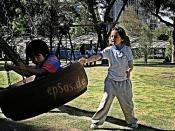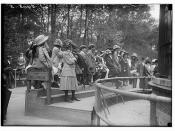Research tells us how young children learn most effectively through interactions with others (Azar, 2002). An article called ÃÂAt the Zoo: Kindergartners Reinvent a Dramatic Play Area,ÃÂ explains how two teachers tried to see how they could incorporate literacy and creativity into dramatic play of 22 kindergarten children in fall 2008 (Bowne; Brokmeier, 2008). This article defines the cluster of concepts related to pretend play and cognition, and briefly synthesizes the latest research on the role of such play in children's cognitive, social, and academic development. The article notes that a growing body of evidence exists to suggest that high-quality pretend play is an important facilitator of abstract thought, higher-level cognition, and that pretend play, social, and emotional competence is clearly linked.
It is quite a phenomenon to me that emotional competence and theory of mind are greatly linked with pretend and physical play. Theory of mind is a personÃÂs thinking about what other people might be thinking.
Once theory of mind is developed, which develops by about age 4, the child has an understanding that others have thoughts and ideas that are different from their own (Perner, 2000).
In this article, the teachers encouraged the children to come up with their own ideas on how they could change their play area into something more exciting. Most of the children were observed acting out types of animal play. The teachers had the children generate a list of ideas to incorporate in the dramatic play area which included: Castle/Palace, Doctors office, Library, the Zoo and a few others, and then had the children vote on which theme should be created. The Zoo theme was chosen by 7 students and next in line was Castle/Palace with 4 votes. The teachers tried different techniques to interest the children in the Zoo theme...


